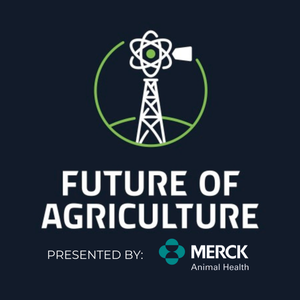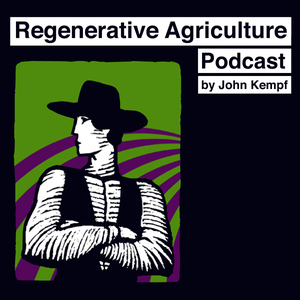
Agtech - So What?
Sarah Nolet
We tell the stories of innovators at the intersection of agriculture and technology to answer the question: what really is agtech and why should you care?
- 34 minutes 14 secondsHow Business Model Innovation Changed AgTech in 2024
There’s nothing like the end of another year to have us reflecting on the recent successes in the world of agtech, and the many challenges still left to overcome. One thing that has continued to stand out to us in 2024 is the vital need for more business model innovation.
There’s so much amazing technology that already exists, but for one reason or another, it is not getting adopted or utilized; it’s not delivering on the promised impact or commercial potential. Over the last twelve months we’ve talked to countless entrepreneurs and innovators who are finding novel and fascinating ways to overcome business model barriers, even when they aren’t using those words to describe their efforts.
So this week, Sarah is sitting down with Tenacious Ventures Managing Partner Matthew Pryor to connect the dots on business model innovation that we’ve discussed in different podcast episodes all year long.
For more information and resources, visit our website.
The information in this post is not investment advice or a recommendation to invest. It is general information only and does not take into account your investment objectives, financial situation or needs. Before making an investment decision you should read the information memorandum and seek financial advice from a professional financial adviser. Whilst we believe Information is correct, no warranty of accuracy, reliability or completeness.
11 December 2024, 7:00 pm - 38 minutes 41 secondsShortening the Long Game in Livestock Breeding with Gerard Davis from Nbryo
The history of agriculture is a history of selective breeding. Whether it’s plants or animals, humans have been choosing desirable traits and making sure those traits make it to the next generation for tens of thousands of years. The challenge of this work is, of course, the timeline. Groundbreaking and world-changing advances are possible, but we are limited by seasonality, gestation periods, and even by the level of expertise required to effectively perform the high-tech work. This is the challenge that Tenacious portfolio company Nbryo is tackling– shortening the timeline for genetic advancements in livestock.
This week, we’re sitting down with Gerard Davis, CEO of Nbyro, to discuss his unconventional journey to the startup, the work the company is doing, and why he thinks genetic interventions are critical climate work.
For more information and resources, visit our website.
The information in this post is not investment advice or a recommendation to invest. It is general information only and does not take into account your investment objectives, financial situation or needs. Before making an investment decision you should read the information memorandum and seek financial advice from a professional financial adviser. Whilst we believe Information is correct, no warranty of accuracy, reliability or completeness.
27 November 2024, 7:00 pm - 37 minutes 58 secondsRethinking Who Pays in Irrigation AgTech with Jairo Trad
Despite its importance to both agricultural and environmental outcomes, irrigation has not been a terribly successful subsection of agtech. We have our theories about why that is (we wrote a whole report about it, The agtech adoption dilemma: Irrigation), and many others have also spotted the challenges in this space.
But when Jairo Trad and his team dug in, they saw an opportunity for business model innovation. Their path, via Argentinian agtech company Kilimo, has been far from smooth, but where they’ve ended up seems to be a unique unlock for adoption and value capture.
This week, we’re sitting down with Jairo, CEO and Cofounder at Kilimo, who’s spent the last 14 years expanding the boundaries of the ag-water system to find the right answer to the question “who pays for water efficiency improvements.”
For more information and resources, visit our website.
The information in this post is not investment advice or a recommendation to invest. It is general information only and does not take into account your investment objectives, financial situation or needs. Before making an investment decision you should read the information memorandum and seek financial advice from a professional financial adviser. Whilst we believe Information is correct, no warranty of accuracy, reliability or completeness.
13 November 2024, 7:00 pm - 33 minutes 53 secondsThe Two Faces of Global ESG in Ag with Catherine Marriott
Depending on where you sit, the supremacy of ESG (Environmental, Social, and Governance) action seems inevitable. Corporates are talking about. Investors are talking about it. Governments, regulators, and even farmers are talking about it. And yet for many of us, the questions of what exactly ESG is, what pursuing these goals means, and how soon acting on them will be mandatory remain unanswered. Then just when it feels like we start to get a handle on a definition or a timeline, you leave one geography and enter another, and it seems like all the rules have changed!
This level of ambiguity has piqued our interest to learn more about trends in ESG, global variations in ESG practices, and what the future might hold. So this week, we’re sitting down with Catherine Marriott, recent Nuffield Australia Awardee, who has spent the last year traveling around the world to learn about the current and future state of ESG in agriculture.
For more information and resources, visit our website.
The information in this post is not investment advice or a recommendation to invest. It is general information only and does not take into account your investment objectives, financial situation or needs. Before making an investment decision you should read the information memorandum and seek financial advice from a professional financial adviser. Whilst we believe Information is correct, no warranty of accuracy, reliability or completeness.
30 October 2024, 7:00 pm - 41 minutes 4 secondsFractal Ag Pitch Breakdown with Ben Gordon and Shane Thomas
Farmland has long been a popular asset among investors for its steady appreciation and resistance to economic downturns. At the same time, farmland is also a challenging asset at times, especially for farmers looking to expand, given farmland comes up for sale so infrequently and is so valuable. In the space between these two needs is where Fractal Agriculture has set up shop, connecting the dots between farmers seeking capital and investors looking to benefit from farmland investments. And for good measure, sprinkle in some regenerative ag practices for risk mitigation on both sides of the ledger.
Today, Sarah and Shane Thomas, author of Upstream Ag Insights, sit down with Ben Gordon, co-founder and CEO of Fractal Ag, to break down the pitch in real time. Along the way, they share insights, ask questions, and decide whether they’d invest in the endeavor.
For more information and resources, visit our website.
The information in this post is not investment advice or a recommendation to invest. It is general information only and does not take into account your investment objectives, financial situation or needs. Before making an investment decision you should read the information memorandum and seek financial advice from a professional financial adviser. Whilst we believe Information is correct, no warranty of accuracy, reliability or completeness.
16 October 2024, 7:00 pm - 32 minutes 27 secondsInvesting in Regenerative Agriculture Supply Chains with Calla Rose Ostrander
When it comes to leveraging capital to fund climate action in agriculture, few ideas get as much play as regenerative agriculture. The idea of production that can not only be sustained but that can actively help renew resources has captured imaginations within the sector and without, giving life to events like the Regenerative Food Systems Investment Forum, where the faithful share strategies to incentivize investors to sink their resources into these solutions. Sarah is headed to the RFSI Forum this year (October 9th and 10th in Denver, Colorado), and to get a jump on the valuable discussions, we’ve invited conference speaker Calla Rose Ostrander, Co-Founder and Managing Partner Terra Regenerative Capital, joins us today to talk about her journey to the important and challenging work of investing in regenerative ag opportunities.
For more information and resources, visit our website.
The information in this post is not investment advice or a recommendation to invest. It is general information only and does not take into account your investment objectives, financial situation or needs. Before making an investment decision you should read the information memorandum and seek financial advice from a professional financial adviser. Whilst we believe Information is correct, no warranty of accuracy, reliability or completeness.
2 October 2024, 8:00 pm - 31 minutes 53 secondsWhen Kansas Drys up… in 2050 with Dan Northrup
There are many parts of the US that are at risk for severe drought and heat in the next 30 years due to climate change. But then there’s Kansas, where some growers pull irrigation water from a particularly vulnerable part of the gigantic Ogallala aquifer, which according to the latest science, may well be fully depleted by 2050. Western Kansas isn’t exactly the heart of the corn belt, but farming in the region does support substantial nearby livestock industries, including large confined dairy and beef cattle operations. If feed becomes sparse, or must come from more expensive, more distant geographies, the regional economic disruptions could be vast.
Dan Northrup, part of Galvanize Climate Solutions’ Science and Tech team and an Associate Professor at Iowa State University, joins us today to talk about the risks, and opportunities, that this kind of water vulnerability introduces, and where he thinks public and private investors can act now.
For more information and resources, visit our website.
The information in this post is not investment advice or a recommendation to invest. It is general information only and does not take into account your investment objectives, financial situation or needs. Before making an investment decision you should read the information memorandum and seek financial advice from a professional financial adviser. Whilst we believe Information is correct, no warranty of accuracy, reliability or completeness.
18 September 2024, 8:00 pm - 39 minutes 31 secondsUnconventional Farmer-led Finance Strategies with Quint Pottinger
Despite challenging conditions in financial markets the world over, ambitious entrepreneurs find a way. There are few sectors where that is more true than in agriculture, and despite the industry’s reputation for convention and conservatism, challenging times call for creative measures, and farmers are nothing if not creative.
To learn more about innovative farm business models and the cutting edge of farm financial strategies, we invited Quint Pottinger, Owner of Affinity Farms in Kentucky, USA. Quint is not only bringing in hedge fund investors, he’s selling all his crops– corn, soybeans, wheat, and rye– into specialty markets and finding hefty premiums for doing so, all while improving his local community’s sustainability and creating a transformed future food system where his farm will thrive.
For more information and resources, visit our website.
The information in this post is not investment advice or a recommendation to invest. It is general information only and does not take into account your investment objectives, financial situation or needs. Before making an investment decision you should read the information memorandum and seek financial advice from a professional financial adviser. Whilst we believe Information is correct, no warranty of accuracy, reliability or completeness.
4 September 2024, 8:00 pm - 36 minutes 23 secondsAg’s Scifi (and Non-Fiction) Future: Horizon Scanning… so what? with Shane Thomas
We’ve been thinking (and talking, and writing) a lot lately about the forces that are shaping the future of agriculture. There are the more obvious ones– artificial intelligence and mandatory climate disclosures– to the less obvious, like the ubiquity of remotely sensed data and geoengineering. All of these forces, and others like them, are not only acting on ag and the institutions the industry depends on, they’re also acting on one another, evolving and compounding all the time.
We investigated these forces, and four critical scenarios that they might create, in our latest report, Navigating a Future of Cross-Sectoral Forces, commissioned by AgriFutures Australia. This week, Tenacious co-founders Sarah and Matthew are joined by research collaborator Sarah Mock and Shane Thomas, author of Upstream Ag Insights. Together, they discuss:
For more information and resources, visit our website.
The information in this post is not investment advice or a recommendation to invest. It is general information only and does not take into account your investment objectives, financial situation or needs. Before making an investment decision you should read the information memorandum and seek financial advice from a professional financial adviser. Whilst we believe Information is correct, no warranty of accuracy, reliability or completeness.
21 August 2024, 8:00 pm - 35 minutes 23 secondsCitrus Moves North with Farmer and Orangepreneur Lindy Savelle
When people talk about the impacts of climate change on agriculture, they usually use the future tense. The reality, though, is that climate change already is, and has been, changing global conditions enough to cause meaningful shifts in agricultural production. Case in point, where Florida was once known both nationally and globally as the US’s citrus powerhouse, today the groves are moving North, where farmers in Georgia are starting to establish citrus production with aplomb.
To learn more about this story of adaptation and resilience, we invited Lindy Savelle, self-proclaimed Orangepreneur at JoNina Farm and a founder and leader of Georgia Grown Citrus.
For more information and resources, visit our website.
The information in this post is not investment advice or a recommendation to invest. It is general information only and does not take into account your investment objectives, financial situation or needs. Before making an investment decision you should read the information memorandum and seek financial advice from a professional financial adviser. Whilst we believe Information is correct, no warranty of accuracy, reliability or completeness.
7 August 2024, 8:00 pm - 40 minutes 44 secondsHow Syngenta is thinking about AI with Feroz Sheikh
Not too long ago, we co-published a paper on the future of AI called “Yield Maps Killed AgTech Software, Can AI Save It?” and got a ton of great responses from across the industry. One such responder wrote in from his seat at the Syngenta Group, where he’s helped the organization go from zero to 250 million acres digitally served in just five years. Feroz Sheikh, Chief Information and Digital Officer at Syngenta Group, offered some incredibly nuanced responses to the limitations and opportunities in this space, and we knew we wanted to have him come on to talk more about his internal perspective on evaluating AI, advancing digitization goals in a legacy ag organization, and what he see in the future of ag software.
For more information and resources, visit our website.
The information in this post is not investment advice or a recommendation to invest. It is general information only and does not take into account your investment objectives, financial situation or needs. Before making an investment decision you should read the information memorandum and seek financial advice from a professional financial adviser. Whilst we believe Information is correct, no warranty of accuracy, reliability or completeness.
24 July 2024, 8:00 pm - More Episodes? Get the App
Your feedback is valuable to us. Should you encounter any bugs, glitches, lack of functionality or other problems, please email us on [email protected] or join Moon.FM Telegram Group where you can talk directly to the dev team who are happy to answer any queries.
 Future of Agriculture
Future of Agriculture
 EconTalk
EconTalk
 Regenerative Agriculture Podcast
Regenerative Agriculture Podcast
 Big Ideas
Big Ideas
 Conversations with Tyler
Conversations with Tyler